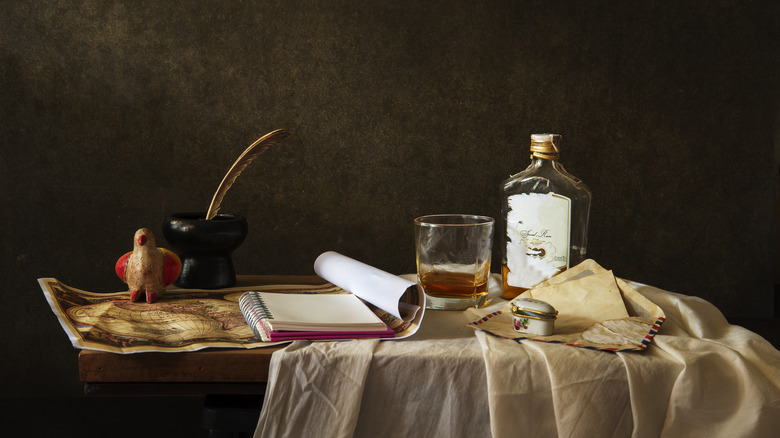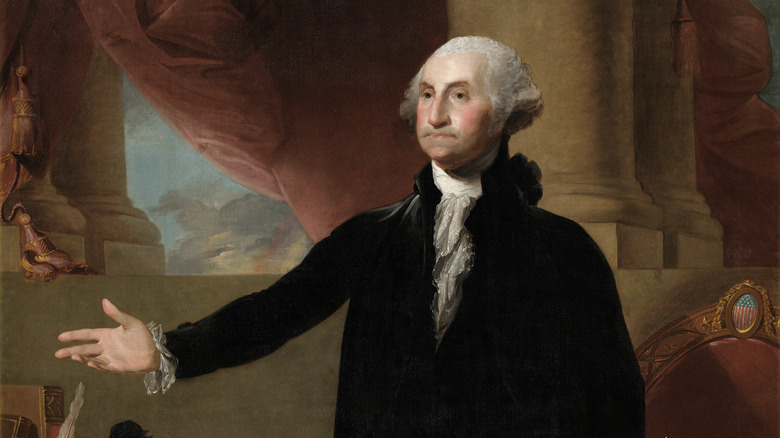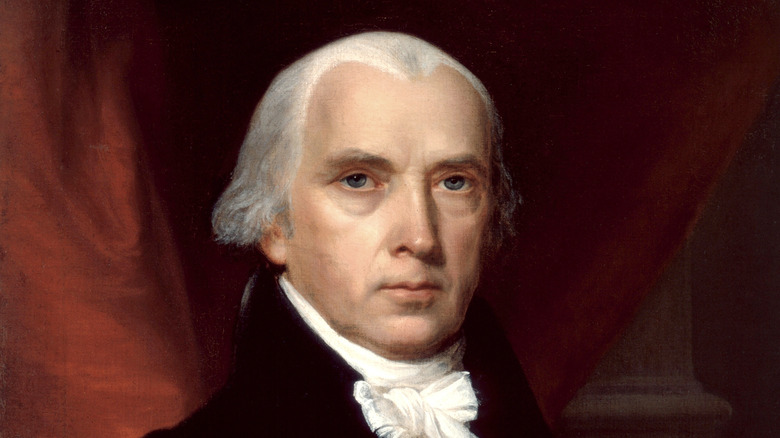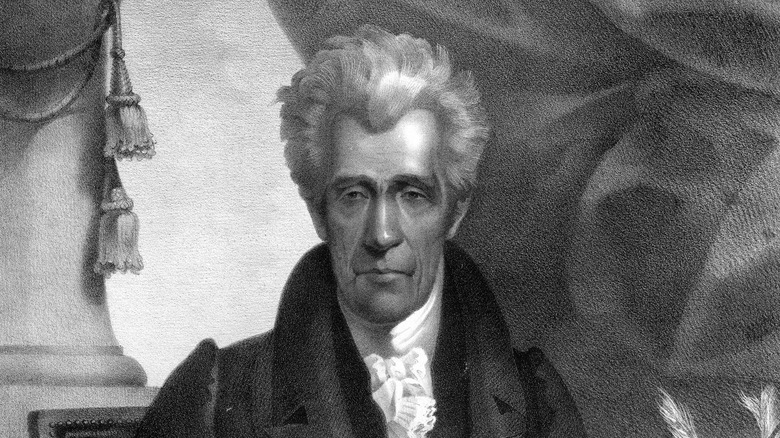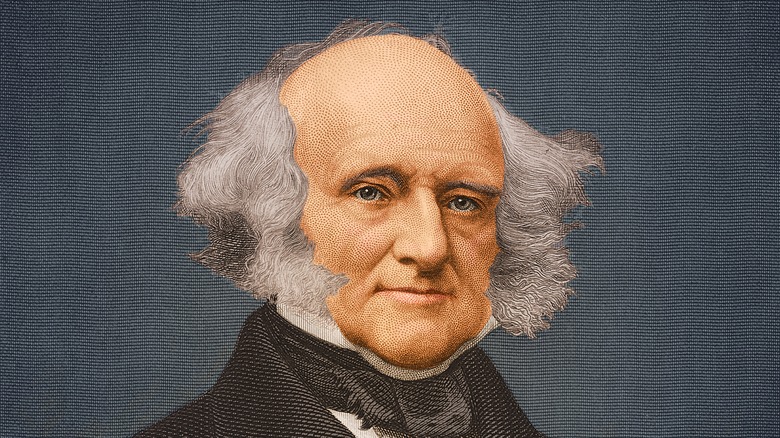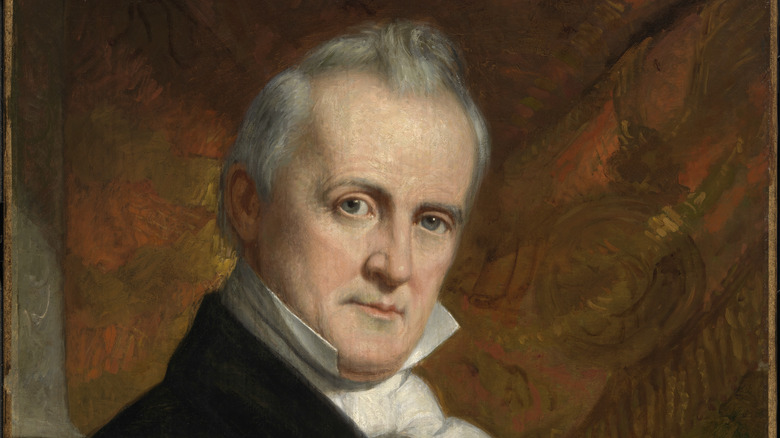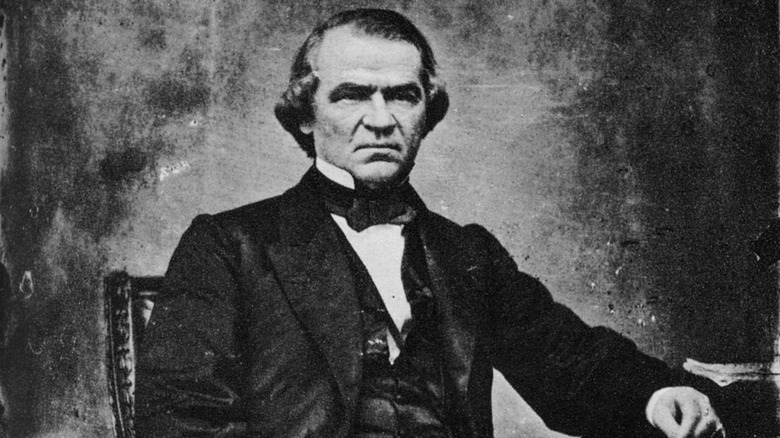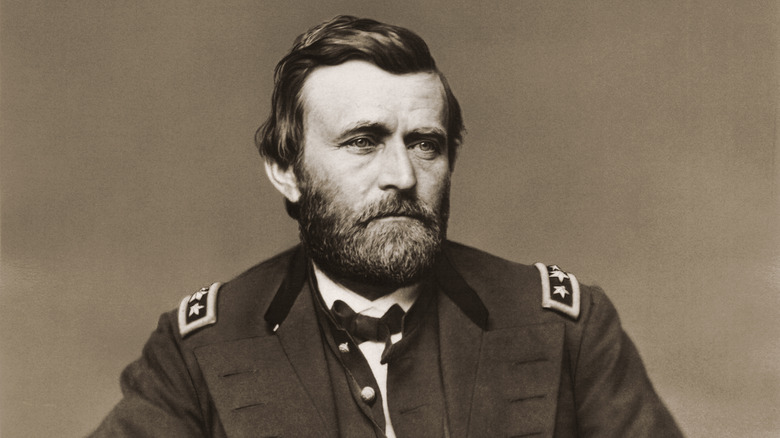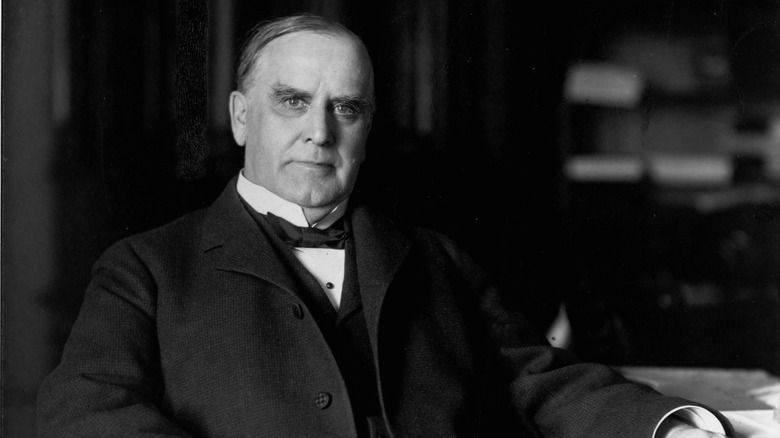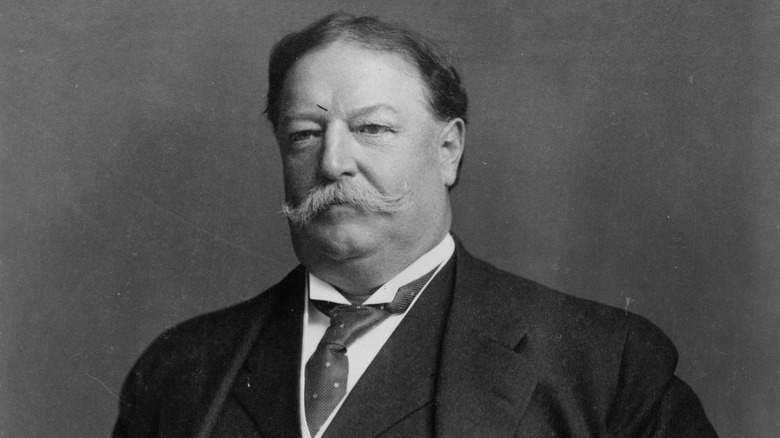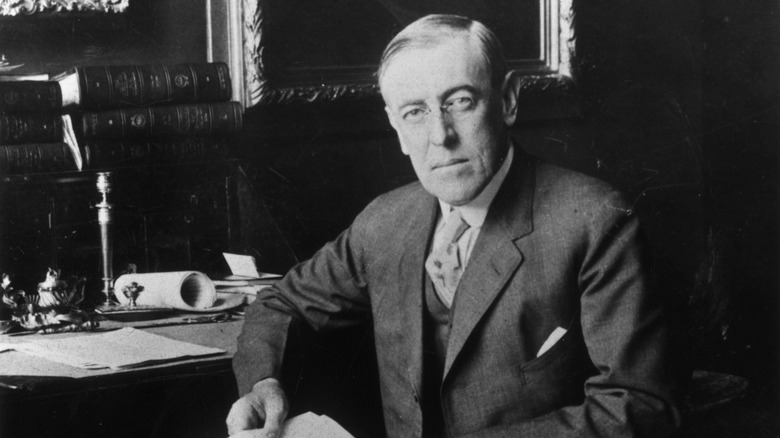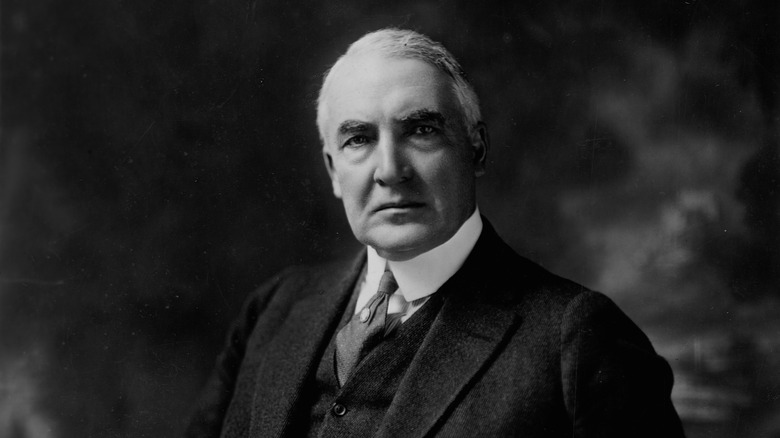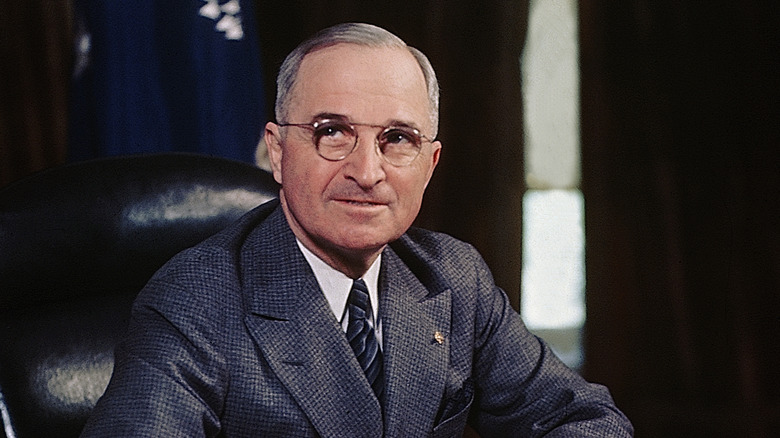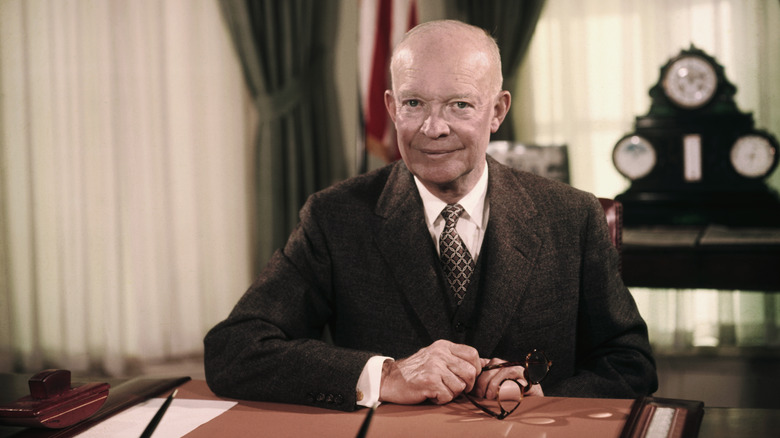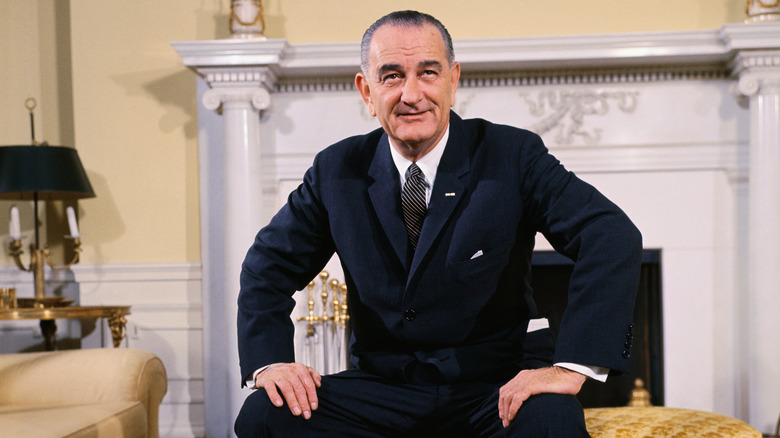14 Former Presidents Who Loved Sipping On Whiskey
Before the American Revolution, rum had been the drink of choice amongst the denizens of the Thirteen Colonies. But afterwards, with independence won from Britain (and access to British rum ingredients running dry), whiskey became the next spirit of choice, and quickly rose to popularity as part of the up and coming United States' new identity. With many revolution-era American settlers hailing from the British Isles, it's no surprise that whiskey, with strong ties to both Ireland and Scotland, was primed to become the next American spirit.
Enjoyed by all echelons of the populace, whiskey was a particular favorite among many American presidents, a taste dating all the way back to the original POTUS. It has since been the preferred liquor of a sizable handful of chiefs of state, which they consumed in quantities both large and small. Presidential tastes for the drink over the past 250 years vary as widely as the varieties of whiskey themselves. Some former presidents preferred bourbon vs traditional whiskey, others preferred scotch to bourbon, but all among these presidential whiskey sippers had a significant relationship to the spirit. Some of their whiskey-fueled escapades might surprise you.
1. George Washington ran his own distillery
The United States' first President from 1789 to 1797 enjoyed liquor in moderation. Though he was generally more partial to foreign wines like Madeira and port's characteristic sweetness, he started a commercial whiskey operation on his Mount Vernon property to turn a bit of profit. Washington's distillery was, for its time, one of the biggest in America, and proved to be a lucrative business just as the nation was changing its tastes to whiskey as opposed to the no longer trendy British rum. Sold to locals and neighbors in the state of Virginia, Washington's whiskey was unaged rye, but no less lucrative for lack of aging. At the height of this operation, the Mount Vernon distillery generated 11,000 gallons of whiskey in one year.
Though whiskey became a significant part of Washington's life through the distillery, the spirit also defined his presidency directly. In 1791 Washington passed a bill for a "whiskey tax" directed towards the distillation of alcohol, among the first domestic taxes the new American federal government enacted. Though intended to help pay off the debt of the American Revolution, the tax was highly unpopular with farmers just starting up business and backfired with violence that escalated into a full-scale Whiskey Rebellion. Washington's militia settled the revolt, and whiskey was no less popular afterwards, but the whiskey tax remained largely unenforceable when citizens continually refused to pay it. Eventually, President Jefferson repealed the tax in 1802.
2. James Madison drank a pint of whiskey a day
An introverted Founding Father, James Madison, the 4th president of the United States from 1809 to 1817, did not imbibe as heartily as his contemporaries. He drank, of course, but not with abandon, according to the standards of his day. Whiskey, so the stories go, was something he limited to a mere pint a day. This may seem unimaginably excessive to a modern perspective, but was still considered to be a relatively moderate amount at the end of the 18th century.
People in the 1700s drank a lot more alcohol on a daily basis than we do today. This was part of the culture of the time period, which viewed alcohol as something that could be medicinal. Liquor was often consumed instead of water to avoid illness due to poor water quality; at the time, alcohol was generally a safer beverage for people of all backgrounds to whet their whistles. Consequently, anyone naturally inclined towards whiskey had ample reason to imbibe, and Madison was no exception.
3. Whiskey might have inspired Andrew Jackson to become president
Andrew Jackson, the 7th U.S. president from 1829 to 1837, was the second to have run a full-scale whiskey distillery on his own personal estate. But Jackson distilled whiskey on his Hunter's Hill property in Tennessee long before he ever got into politics. In fact, a fire which burned his entire distilling operation in 1799 may be directly linked to his determination to become president. Forced to pay Washington's aforementioned whiskey tax on the 300 gallons of whiskey that he'd lost in the fire, Jackson partook in the spirit of the Whiskey Rebellion, and was so upset he filed an appeal — which the House of Representatives promptly rejected. Some historians speculate that Jackson's whiskey incident may have inspired enough bitterness to fuel his presidential campaign twenty years later.
While his legacy is not remembered fondly, Jackson's inauguration party was a bash for the history books. Opening up the White House to the people, he fueled a crowd to drunkenness with endless bowls of whiskey punch and trashed the place. But aside from this bacchanal at the capital to jumpstart his presidential career, Jackson was not known to be a particularly excessive drinker. Henceforth, he continued to enjoy his whiskey in moderation.
4. Martin Van Buren had a whiskey reputation
Martin Van Buren, 8th president of the United States from 1837 to 1841, was known in his time perhaps even more widely for his love of whiskey than for his political agendas. He drank with no restrictions, and though he was small in stature, astounded many with his ability to chug whiskey without feeling its effects — or at least, without showing any effects he may have felt. Van Buren drank so much whiskey, in fact, that he earned himself the nickname "Blue Whiskey Van."
Perhaps his drinking habits, which were no secret amongst both politicians and the populace, contributed to the spirit of unpopularity, which quickly defined Van Buren's presidency. In any case, he was not re-elected. This may have been largely due to his opponent in the 1840 election, William Henry Harrison, depicting Van Buren as a drunkard, which was not good publicity, though not entirely untrue.
5. James Buchanan was raised on rye
Born in Pennsylvania, James Buchanan, the 15th American president from 1857 to 1861, grew up on rye whiskey, specifically the state's local "Old Monongahela" rye. At the time, Old Monongahela was a legendary rye whiskey, though few details of its recipe remain today to quantify what made this old American spirit so unique and sippable.
Buchanan eventually developed an interest in other varieties of alcohol, but whiskey remained a foundational tipple throughout his life. Living in D.C. once he got into politics, Buchanan was a regular customer of local and renowned whiskey distiller, Jacob Baer. Buchanan ordered 10 gallons of Baer's whiskey every week, which he went off to purchase during Sunday church services. While he was genuinely an ardent fan of Baer's whiskey, which he found to be exceptional, Buchanan also enjoyed the spirit's nickname, "Old J.B. Whiskey," which was a coincidence of initials fitting for the spirit's most avid customer.
6. Andrew Johnson drank too much whiskey
Andrew Johnson, who would go on to become the 17th U.S. President from 1865 to 1869, advanced rapidly in his political career when Abraham Lincoln appointed him as his vice president during his 1864 reelection campaign. Celebrating early, Johnson partied too hard on the eve of the inauguration. As an attempt to quell his hangover the following morning, he prescribed himself a few hefty doses of whiskey and proceeded to drunkenly rant while in front of the crowds assembled to witness his swearing in. This offended people into calling for his resignation, but Honest Abe was convinced "Andy" had embarrassed himself and everyone else present so thoroughly he wouldn't dare to try a similar public stint ever again.
Off to a bad start, Johnson's whiskey-fueled entrance into the Executive Branch of government only spiraled into further disaster after he became president by default a month later, following Lincoln's assassination. Johnson's rise to the presidency ended with him becoming the first president to be impeached. A fair bit of whiskey was probably imbibed after that decision too.
7. Ulysses S. Grant liked Kentucky Bourbon
Even before he became the 18th U.S. President from 1869 to 1877, Ulysses S. Grant had a reputation for drunkenness, and whiskey was his preferred libation. Prior to his election, accounts of Grant reeling with whiskey in hand during his days as a Civil War general were not uncommon, though his drinking habit might have stemmed from a doctor's prescription (whiskey — and alcohol in general — was a popular painkiller in those days).
While Grant's fondness for the bottle didn't prevent him from success on the battlefield, many questioned his validity as a military leader all the same. A famous yarn surrounds Grant's relationship to whiskey and battle strategy, from Alexander K. McClure's 1901 book of anecdotes, "Lincoln's Yarns and Stories." As the tale goes, when politicians approached President Lincoln proclaiming that Grant was a drunkard who shouldn't be in command of an army, the president's reply was simply, "You needn't waste your time getting proof; you just find out, to oblige me, what brand of whiskey Grant drinks, because I want to send a barrel of it to each one of my generals." As to what brand of whiskey Grant actually did like to drink, speculations have settled on a known Kentucky bourbon of the time, Old Crow. Whether or not it was his favorite, it was certainly a whiskey Grant did imbibe.
8. William McKinley enjoyed a nightly whiskey nightcap
William McKinley, the 25th American president from 1897 to 1901, enjoyed whiskey in much more moderate amounts than some of his forebears. But the fact that he drank any whiskey at all alarmed some of the American populace, as McKinley had previous political leanings in favor of the era's growing temperance movement before he ascended to the Oval Office. Opting not to take a divisive stance on the legality of selling liquor so as to avoid losing votes, McKinley proceeded into the presidency more in favor of alcohol than not. Rather than prohibiting the sale of alcohol like the temperance movement called for, McKinley enjoyed spirits daily in his role as president. He is known to have sipped whiskey every night before going to bed.
And McKinley's taste for whiskey was no secret. Scottish industrialist Andrew Carnegie sent him barrels of Dewar's Scotch as gifts, and a new whiskey cocktail of the era was named McKinley's Delight in the president's honor. A twist on the Manhattan, the McKinley's Delight cocktail combines absinthe, brandy, and vermouth in addition to whiskey.
9. William Howard Taft defined whiskey
There is little information detailing 27th president William Howard Taft's personal relationship to alcohol, let alone whiskey. But his time as president from 1909 to 1913 is directly connected to the spirit. Purportedly a light drinker during his time in the White House, Taft didn't consume much of any form of alcohol except the occasional glass for social events. It is perhaps a little ironic that one of his legacies as president is the Taft Decision of 1909, which specifically defined what whiskey was or could be.
Overseeing a growing dispute amongst whiskey producers in the wake of the Pure Food and Drug Act passed three years before, Taft was faced with the legacy of food and drugs being literally defined by the government so that they could be regulated. The Pure Food and Drug Act had upset many whiskey distillers whose spirits were made unique with the addition of certain color or flavor additives and thus fell outside of the new and very black and white definition of whiskey. Taft's decision remedied this by distinguishing "straight" whiskey as having nothing but water added to it. Whereas whiskey with any additional additives was to be called "blended." Whether one type of whiskey is superior to the other is up to personal taste, but Taft's parameters established in 1909 are the same we use today to differentiate between types of whiskey.
10. Woodrow Wilson used scotch to promote his campaign
The 28th President of the United States from 1913 to 1921, Woodrow Wilson was a fan of scotch whiskey, whether served neat or as a scotch and soda. But beyond being a genuine fan of the spirit, scotch was inherently linked with Wilson's campaign to get to the White House. Among the slogans used to promote his bid for president included one that came directly from a brand of scotch, Wilson Whiskey. The brand's tagline, "Wilson! That's all!" was familiar amongst the American populace well before it became part of Wilson's campaign song.
Besides the coincidence of the name between whiskey brand and presidential candidate, the use of a Wilson Whiskey's slogan was a strategic move as well. Aligning Woodrow Wilson's name with alcohol was a bold choice in the era of a growing temperance movement. The Senate and House of Representatives voted in favor of the 18th Amendment, which would call for a nationwide prohibition of alcohol, while Wilson was president. But Wilson's whiskey-aligned campaign had emphasized his stance on Prohibition, which he stuck to throughout his presidency: He was not in favor of Prohibition, as he did not believe it could be realistically enforced.
11. Warren Harding sipped whiskey during Prohibition
The 29th American president from 1921-1923, Warren G. Harding was a whiskey fan in secret during his Prohibition-era presidency. But it was somewhat of a well-known secret amongst his peers that he kept a stash of whiskey at the White House. An avid poker player, Harding hosted poker nights every week at the White House, during which whiskey was available in ample supply. When he was out on the golf course, Harding also kept whiskey on hand in his golf bag, which he would reach for to enjoy a few sips throughout a game.
Harding's taste for whiskey while in office makes it a bit hypocritical that he voted in favor of Prohibition before he became president. Ironically, much of his presidential whiskey supply came from whiskey that agents had confiscated in the name of Prohibition. But imbibing liquor in the Prohibition era was just one of many scandals that marked Harding's time in the White House, though he died three years into his presidency before all his scandals could come to light. His cause of death remains a slight mystery, but a heart attack is the prevailing theory, for which a whiskey habit probably didn't help.
12. Harry S. Truman was fond of bourbon
Harry S. Truman, the 33rd U.S. president from 1945 to 1953, had a well-known penchant for bourbon. President during the last years of WWII, his time at the White House was during an era that had long since bid farewell to Prohibition. Consequently, there was no secret about his favorite spirit, which was an essential part of his daily routine. Biographies about Truman have revealed amongst the details of his days as president that each one began with a shot of bourbon.
Truman enjoyed two brands of Kentucky bourbon in particular – Wild Turkey and Old Grand Dad. He once received an entire case of the latter for Christmas during his time in the Oval Office. Stories in jest suggest that true to Truman's love of bourbon, his favorite mixed drink was an old-fashioned — except the running joke at the White House was that he preferred such a cocktail without the requisite bitters, sugar, or garnish.
13. Dwight D. Eisenhower developed a taste for scotch
Dwight D. Eisenhower, 34th president of the United States from 1953 to 1961, got his taste for scotch while overseas, acting as Supreme Commander of Allied Forces in Western Europe during the WWII. While planning the Normandy D-Day invasions from England, he may have had easier access to local scotch, which was being carefully rationed in the UK during wartime to utilize grains as an essential food source rather than a distillery ingredient.
However Eisenhower got a taste of scotch, it remained his drink of choice even after the end of WWII. Once he'd returned to the States and eventually became president, "Ike" and First Lady "Mamie" Eisenhower served cocktails before dinner when entertaining guests, an epicurean trend gaining traction in the mid-20th century. Even at cocktail hour, Eisenhower usually opted for his usual scotch whiskey, whether served with soda or on the rocks. Official memos suggest that he had a few whiskey brands he preferred, among them Chivas Regal, Dimple Scotch, or Black Dog whiskey, all with old Scottish roots.
14. Lyndon B. Johnson enjoyed scotch too
The 36th U.S. president from 1963 to 1969, Lyndon B. Johnson was a known fan of scotch in general, and of the brand Cutty Sark in particular. His mixed drink of choice was, unsurprisingly, a scotch and soda. Throughout his career in politics he requested these scotch highballs to be mixed weaker than those of anyone joining him for a drink, a convenient tactic for negotiations to give him the upper hand with a clearer head.
When not sipping scotch over presidential presidings, Johnson enjoyed his favorite spirit just as much — if not more — on his ranch in Texas. Accounts describe in great detail one of Johnson's spirited pastimes: While cruising around his property, he would sip scotch and soda from a styrofoam cup, which he would stick out the window for a Secret Service agent to refill every time he needed a top up.
If you or anyone you know needs help with addiction issues, may be the victim of child abuse, or has experienced a hate crime, contact the relevant resources below:
-
The Substance Abuse and Mental Health Services Administration website or contact SAMHSA's National Helpline at 1-800-662-HELP (4357).
